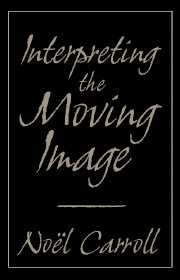Book contents
- Frontmatter
- Contents
- Foreword: Through Carroll's Looking Glass of Criticism
- Introduction
- 1 The Cabinet of Dr. Kracauer
- 2 Entr'acte, Paris and Dada
- 3 The Gold Rush
- 4 Keaton: Film Acting as Action
- 5 Buster Keaton, The General, and Visible Intelligibility
- 6 For God and Country
- 7 Lang, Pabst, and Sound
- 8 Notes on Dreyer's Vampyr
- 9 King Kong: Ape and Essence
- 10 Becky Sharp Takes Over
- 11 Interpreting Citizen Kane
- 12 The Moral Ecology of Melodrama: The Family Plot and Magnificent Obsession
- 13 Mind, Medium, and Metaphor in Harry Smith's Heaven and Earth Magic
- 14 Welles and Kafka
- 15 Nothing But a Man and The Cool World
- 16 Identity and Difference: From Ritual Symbolism to Condensation in Anger's Inauguration of the Pleasure Dome
- 17 Text of Light
- 18 Joan Jonas: Making the Image Visible
- 19 Introduction to Journeys from Berlin/1971
- 20 The Future of Allusion: Hollywood in the Seventies (and Beyond)
- 21 Back to Basics
- 22 Amy Taubin's Bag
- 23 Herzog, Presence, and Paradox
- 24 Film in the Age of Postmodernism
- Notes
- Index
12 - The Moral Ecology of Melodrama: The Family Plot and Magnificent Obsession
Published online by Cambridge University Press: 05 June 2012
- Frontmatter
- Contents
- Foreword: Through Carroll's Looking Glass of Criticism
- Introduction
- 1 The Cabinet of Dr. Kracauer
- 2 Entr'acte, Paris and Dada
- 3 The Gold Rush
- 4 Keaton: Film Acting as Action
- 5 Buster Keaton, The General, and Visible Intelligibility
- 6 For God and Country
- 7 Lang, Pabst, and Sound
- 8 Notes on Dreyer's Vampyr
- 9 King Kong: Ape and Essence
- 10 Becky Sharp Takes Over
- 11 Interpreting Citizen Kane
- 12 The Moral Ecology of Melodrama: The Family Plot and Magnificent Obsession
- 13 Mind, Medium, and Metaphor in Harry Smith's Heaven and Earth Magic
- 14 Welles and Kafka
- 15 Nothing But a Man and The Cool World
- 16 Identity and Difference: From Ritual Symbolism to Condensation in Anger's Inauguration of the Pleasure Dome
- 17 Text of Light
- 18 Joan Jonas: Making the Image Visible
- 19 Introduction to Journeys from Berlin/1971
- 20 The Future of Allusion: Hollywood in the Seventies (and Beyond)
- 21 Back to Basics
- 22 Amy Taubin's Bag
- 23 Herzog, Presence, and Paradox
- 24 Film in the Age of Postmodernism
- Notes
- Index
Summary
In the late 1970s, Hollywood film production is increasingly reliant on traditional genres. The exhumation of old formulas – from the 1950s especially but also from the 1930s and 1940s – is becoming more and more pronounced. Programmatic, albeit often high-budget, horror, scifi, war, and sports films dominate the current fare of domestic releases. To a certain extent this is a result of Hollywood's innate business conservatism: Nothing succeeds like something that succeeded before; old genres never die, they merely await rebirth in another decade. But Hollywood had been more daring in the range and types of films it experimented with from the late 1960s to the mid-1970s. The retreat to genres is not completely an industry initiative; it is also a response to the growing conservatism of the period, which, in turn, is reflected in the films.
Melodrama is among the genres presently being recycled. Two 1978 releases – International Velvet and Uncle Joe Shannon – are particularly interesting because of the similarities of their structures. Both concern the symbolic reconstitutions of families; lost parents are replaced by loving parental figures who, concomitantly, gain surrogate children. In certain respects, these films can be seen as in the lineage of the melodramas of kidnap and restoration that are so important in Griffith's Biograph work. They also recall the Dickensian ploy of an orphan who is rediscovered by a relative. Of course, in Griffith and Dickens, a family is literally reunited, whereas in International Velvet and Uncle Joe Shannon the reconstitution is symbolic.
- Type
- Chapter
- Information
- Interpreting the Moving Image , pp. 166 - 177Publisher: Cambridge University PressPrint publication year: 1998

